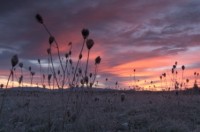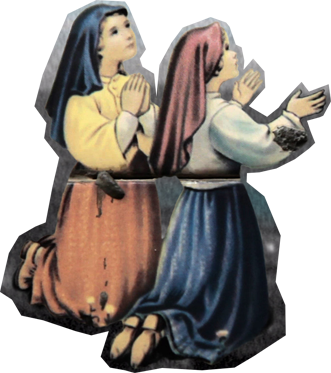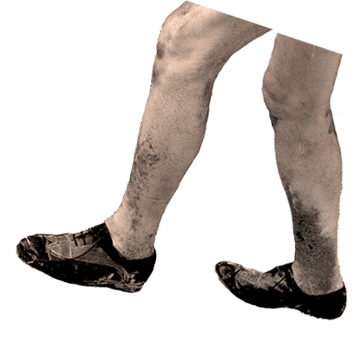LIKA – HUNTING FOR MYSELF
“Lika – hunting for myself” is a film about loses. It could take place in any abandoned, forgotten location. I have decided it should be Lika, a forgotten mountain region of Croatia, the birthplace of my parents where I learned to be in touch with nature and wilderness. It helped me overcome the loss of my four unborn children and understand my illness. The film has a hermetic six-part structure: prologue, spring, summer, autumn, winter, epilogue. Apart from nature, I am filming four people that are a metaphor of my grandparents. They represent four stages of human life. Every character is connected with one season: an old man with spring, a mature man with summer, a young woman with autumn, and a child with winter. The characters, nature, animals, even me (parts of my body, shadows, footprints in the snow…) serve my voice over story which is a mosaic of memories, experiences and my poetry.It is maybe best to explain it this way: Lika is full of caves, holes in the rocks, wells, abysses. When I was a little girl, we used to play the game of waiting: take a stone, throw it in the hole and then listen for the stone to hit the bottom of the hole. I threw so many stones in my life but I have never found the time to listen. One day I decided to listen, and this film is what I have heard. This film is the answer from the cave cold life.
The Wellness ProcessThe Wellness Process
Director: Zrinka Matijević.
Producer: Nenad Puhovski
Production company: Factum
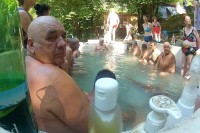 THE WELLNESS PROCESS
THE WELLNESS PROCESS
An ancient resort city in Romania, Baile Herculane (Herculaneum Baths) that has seen much better days serving the “wellness” industry and it’s people seek to revive it while also healing themselves. A touristic routine of the treatment, of trying to relax and improve the quality of life, within an urban degraded set-up where exotic meets ridiculous. A film about people who, in the lack of a social system that offers wellness recipes, improvise and find their own definition of well-being and relaxation.
Director: Marius Iacob
Producer: Corina Gliga
PProduction company: Manekino Film
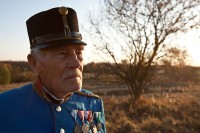 GHOSTS
GHOSTS
A multi genre project about memory of a place, where the history of 20th century was marching through. Only ruins remained today and parts of the history are becoming forgotten. Lost stories as ghosts reside in the crumbling buildings. We would like to revive ghosts and resurrect fading memory. We will search how the history and memory is imprinted in the landscape along with historians, philosophers and artists. We intend to initiate discussion both in local and international community.
Director: Bibiana Beňová, Michael Kaboš
Producer: Michael Kaboš
Production company: Michael Kabos, Media Film
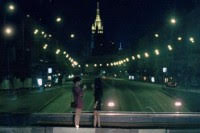 PROVINCIAL GIRLS 2.0
PROVINCIAL GIRLS 2.0
In the year 1994 Tatjana Bozic and Frank Müller made the documentary Provincial Girls (Провинциaлки).The film was about three young girls who came to Moscow from the russian province to seek their fortune there. Each girl had a different approach:The film dealt with a Soviet myth (that strong, provincial girls are trying to conquer Moscow), which is manifested in many films, books and songs. The shooting took place at a time of cultural and social upheaval. Now, almost 20 years later, Tatjana and Frank will travel to Russia to see what has become of their three protagonists.The film represents two generations of young Russian girls who lived in a time of change.Russia is changing. Still today. This change will be represented through the eyes of the protagonists (all of whom are real fighters).Creatively, the film is planned as a parallel montage/ collage with references to Russian and Soviet myths, and plays with archival material.
Director: Tatjana Božić
Producer: Frank Müller
Production company: doppelplusultra
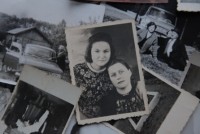 ON THE BORDER
ON THE BORDER
The creative documentary “On the Border” tells a story about fatal choices made in uncertain circumstances during World War II when an ordinary person had to make an important choice between two extremities: to choose family bonds or desire for love.The main characters – sisters – filmmaker Jūratė (30) and photographer Vilma (35), start their journey to find out parallels between their German grandmother’s Ella Fink’s life and their own. They seek to discover their family history inspired by their grandmother life events which happened in autumn of 1945 and later. Ella, at similar age as now are the sisters, chose love over her family, and the sisters wonder if they would behave the same way.After World War II their grandmother’s family decided to move to Germany from Lithuania. However, young Ella Fink chose to wait several days for her fiancé to join her for the trip. In the meantime the political situation changed, borders closed, and the Iron Curtain separated Ella from her family for 40 years. Moreover, her fiancé never showed up.Jūratė and Vilma hit the road in their small car with a camera and visit places that were important to their grandmother. The old house, cemetery, river, bakery and the cheerful discussions between the sisters create a vivid film atmosphere. Sisters are raising a question of identity and faith and try to reconstruct fatal events.
Director: Jurate Samulionyte
Producer: Ieva Norviliene
Production company: Tremora
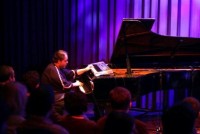 JAZZ WAY OUT
JAZZ WAY OUT
Jazz Way Out (working title) is a story that follows one of the most talented jazz musicians in the world in his search for a manager. In bustling Budapest, where a new bar or club opens every week despite the economic crisis, József Balázs, who plays with the greatest American jazz stars, is struggling to make ends meet, despite his older brother’s constant pushing. Separated by almost a generation, József and his older brother Elemér come from a centuries-long tradition of Gypsy musicians. After the highs of the 1990s, when Elemér’s Trio Midnight band dominated the Budapest jazz scene and the future seemed bright for the young talents, József is struggling to find his place in a market dominated by pop music, DJs and a few stars of Budapest’s underground scene. The brothers’ genius is recognized by all, their fusion of jazz, Gypsy music, blues and R’n’B truly unique. It just does not seem to bring many gigs anymore. As József embarks on a search for a manager, we discover what jazz really is, how musical genius is passed on from one generation to the next, and who the players in the colorful world of Budapest’s jazz scene are. Shot in the picturesque and diverse districts of Budapest, in smoky flats, jazz bars and recording studios, the film is a road movie in the city, an ode to jazz’s creative process, to the people who make it happen, and to brotherhood.
Director: Katalin Barsony
Producer: Marioner Kurucz
Production company: Baxt Films
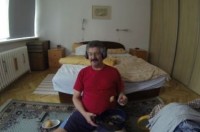 HOMO VIDEO
HOMO VIDEO
Our film wants to notice how television affects the households and declare its crucial role in the configuration of many lives of common people. Television is a medium which gives us opportunity to live parallel lives in our emotional or cognitive sphere. Watching the television allows us in illusive way to experience all kinds of emotions in concentrated mode. While watching TV, choosing the program to watch we declare, what we want to see, what is interresting for us and what we lack in our private lives. By watching we deal with very personal things connected to our real lives, which we experience too or want to experience and TV is our companion by this: love, relationship configurations, family problems, interpersonal interactions, fear, entertainment, gossips, ridicules, excitement, succes… Television affects our view of the world, our thinking, a way of dealing with time and free time. It is part of our habits, stereotypes, escape route from the stress and worry of everyday life. Television influences even the communication between the members of the household. It is so common part of life, so present and spread, that it needs to be reflected in a film.By television watching we can see also some interresting social functions. Sometimes the television brings family together, sometimes it helps to separate people.
Director: Katarina Hlincikova
Producer: Barbara Janišová Feglová
Production company: Academy of Music and Dramatic Art, Hitchhiker Films
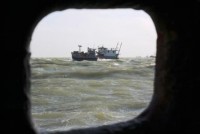 PIRATE FISH
PIRATE FISH
Pirate Fish is a documentary film about an emotional relationship between captain Ludger Dochtermann (70), a German sailing for years in the icy Bering Sea around Alaska, hunting for crabs and salmon, and a man who appeared there by accident and became a part of his life at the very moment the captain wanted to end it.
Director: Boris Veličan
Producer: Dana Budisavljević, Miljenka Čogelja
Production company: Hulahop Film & Art Production
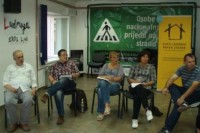 DAYS OF MADNESS
DAYS OF MADNESS
Days of Madness is the working title of an observational participatory documentary that captures three people suffering from different mental disorders. Vlatka, Maja and Mladen are nevertheless striving against the classification of illness. They do not consider themselves as mentally ill but mentally diverse. In their efforts to de-stigmatize their diversity they engaged in the work of Ludruga (Madocciation), an association that enables them to help themselves in social integration but also helps society to acknowledge the normality of the mentally diverse. In their attempts to get off psycho-pharmaceuticals which are indifferently being prescribed to them by their GPs, we see our protagonists in dynamic life situations filled with upheaval. They see healing in friendship and integration and because of that they decided to come up against their accumulated emotional problems and to continually question their inner world but also the outer world that has ruthlessly imposed its rules of “normality”.This inspires them to try and establish The Mad House, a place of security and togetherness that is open for everybody. Still, the biggest changes happen when they are alone so the project of filming themselves in their intimate moments has therapeutical effects for everyone. This is a combination of observational documentary and participatory video that will grasp into the depth of what is quintessential – the feeling of being.
Director: Damian Nenadić
Producer: Oliver Sertić
Production company: Restart
 FIVE
FIVE
In Vilnius central avenue there‘s a palace and behind the neoclassical style facade where used to be the Lithuanian KGB headquarters and its prison. Today that building is the museum of Lithuanian Genocide Victims. Tourists from all over the world walk trough the entrance with a smile and curiosity and leaves with shocked and stunned faces. Just like one of those tourists, after a tour in the basement of the museum, where the prison used to be, Italian filmmaker decided to meet the people whose lives were bound by KGB during the last decade of USSR.This film is a collage of five characters that were taking clashing positions, a collage of their reminiscences and experiences. It‘s a provocative invitation to infiltrate theirs consciences and to perceive their attitude, an experience that can be inspiring with its positivity but frightening by its own truth that might be misbecoming for someone.
Director: Maximilien Dejoie
Producer: Dagne Vildžiunaite
Production company: Just a Moment, Indastria Film
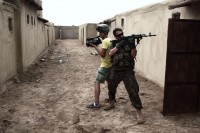 ONE MAN SHOW
ONE MAN SHOW
One Man Show is a bitter-sweet creative documentary. Everyone has dreams. Everyone wants to be successful. Not everyone is.Marcin is an actor, who has never played a significant role in a significant movie. This film will give him a unique chance – Marcin will ‘play’ the main role in the documentary about himself. The film shows one year in the protagonist’s life. This is the year that is supposed to be essential to him (just like the previous one and the next one), the year, in which one has to decide whom to be and how.
Director: Jakub Piatek
Producer: Anna Kepińska, Maciej Kubicki
Production company: Telemark Sp. z o.o.
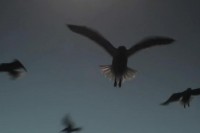 LAST SEASON
LAST SEASON
On extremity of Gdynia city there is a small fishery settlement named Nowe Obłuże. The anglers live and work there from the twenties of 20th century. Grandfather of the main character of the film – Józef, founded it. Józef is a 60 years old angler, native Kashubian, owner of a motor boat by which he and his 23 years old son Jakub sail out for fishing. An arduous outstretching and setting of fishing nets, fish filleting in companionship of herds of seagulls cadence their lives. Each time they return, they have to pull out their boat to the shore manually. A trolley with electric al engine, by which the fish caught are pulled out from the sea to a warehouse situated at the top of the cliff, is the only one convenience. There are only two “cable railways” of this type on Polish seashore. The 86 years old Magdalena, waiting for return of her son and grandson starts this device. When she was young woman, as angler’s wife, she also participated in catches.The fish delivered to warehouse are sold to merchants from the market hall in Gdynia, and sometimes to the tourist and local inhabitants. The father and son earn earn around PLN 1,000 monthly per capita. Everything points that the world known by Józef for all his life will be the past within a year. His older son abandoned a work on the sea long time ago. Now its turn of the younger one, Jakub, who started to look for an onshore job not perceiving any chances for a start of an independent existence. It is not easy.
Director: Slawomir Witek
Producer: Anna Waradzyn
Production company: Staron Film, Polish Filmmakers’ Association Munk Studio
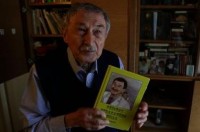 RAJKO DOLEČEK AND HIS DANGEROUS WORLD (OF CALORIES)
RAJKO DOLEČEK AND HIS DANGEROUS WORLD (OF CALORIES)
Professor Rajko Doleček is an incredibly lively and educated 88 year old man. He has dedicated his whole life to the medicine and the fight against calories as the first endocrinologist in Czechoslovakia. In the 70s he became a famous television star with his TV series about healthy living. People love his books about travelling and life. His less known but not less important activity is his unrelenting fight for Serbia and its war “heroes” – Ratko Mladič and Radovan Karadžič. This film aims to show the way of thinking of a person who loves poetry and has been helping people his whole life on the one hand and defends individuals, who are supposed to be the biggest war criminals of the end of the 20th century on the other hand. Is it him or us who is mistaken in their opinion about what is right and fair?
Director: Kristýna Bartošová
Producer: Kristýna Hněvsová
Produkcijska kuća: nutprodukce, FAMU – Film and TV School of the Academy of Performing Arts, Prag
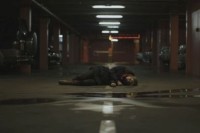 LAUGH IF YOU CAN
LAUGH IF YOU CAN
A story about people who spend most of their time in their dreams – a land so real that making out the difference between the dream and the real world is their curse. They suffer from a rare condition – narcolepsy, which makes them suddenly fall asleep – regardless of their location or the thing that they are doing. They cannot control it. They fall asleep while meeting people, taking care of their children, working or driving. Some fall asleep due to a sudden storm of emotion when they watch an emotional movie, hear a good joke or fight with their spouses. Their bodies betray them. Their dreams tend to be so real that after waking up they cannot tell whether that was a dream or the real world. But the film will not be about the condition but about people whose lives are led in two worlds: the dream-world, which only they can access, and the real world that goes past them, letting their sleep steal the passing and unique moments, about all that goes past them when they are asleep. It will be a story about people who have to deprive themselves of emotions to be able to control their bodies. How can that be – a person forced to subdue emotions in order to live her life? Isn’t that what we aim for us, the “healthy” ones? Just as the narcoleptics, we try to hide our emotions. The only difference is that we do have a choice.
Director: Agnieszka Woszczyńska
Producer: Marta Golba
Production company: Endorfina Studio
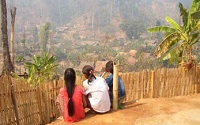 BORDERS
BORDERS
Set on Burma’s frontier, the film crosses between fiction and documentary to explore the thin borderline separating acts of humor and hardship; desires and irony; choices and destinies. The project “Borders” intends to explore a grass-roots perspective upon a character-driven story of common people confronting the Burma border tension. Using art house expression in the service of narrating the human beings’ striving, the film follows the everyday life of a family that survives as internally displaced persons (IDP refugees) in Burma border area, which pressures the neighbor countries with millions seekers for asylum.
The film “Borders” explores the human daily limits, frontiers, blockages causing tribulations that are residing in everybody’s journey towards a safer life. Against the backdrop of hostile environment, war, and social torments, the film presents the irony of human crisis.
Exploring mankind’s vulnerability versus resilience, in the present times of global fight for survival, this film interweaves, apparently not connected, collective destinies around the world, unveiling a subtly interlaced tissue of universal life meanings, despairs and hopes when reality bites sometimes up to death.
Director: Ionut Piturescu, Rumunjska
Production company: Dox:Lab (Danska), Anthropoesis (Rumunjska)
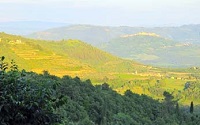 BRIEF EXCSURSION
BRIEF EXCSURSION
The novel as the narrative basis of the film is very simple. A group of ten men and two women spend their summer vacations in Istria region in Croatia. Each day they go on different excursions which nominally have a purpose to explore the artistic and religious heritage of Istria, but they generally end in getting drunk and not caring about science too much. One day, a local guy proposes them to visit Gradina, an abandoned monastery which supposedly has the most beautiful medieval frescos in Istria. An allegorical story about the life and values of a generation can be a fertile ground for a rather unpredictable film exploration. The aim of this film is to make the fictional story from the sixties “alive” by relating it to real contemporary lives.
Director and scenarist: Igor Bezinović, Hrvatska
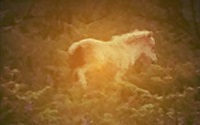 POLEDNICE
POLEDNICE
Inspired by memories of a late grandfather and his dark imagination experienced as a child through his stories. The story is loosely based on the Czech folklore tale, Polednice, as described through my granddad’s imagination. This film is a dream sequence of memories of this man’s unusual rituals and storytelling as well as his own mysterious but beautiful existence. It is also narrated through personal tape recordings and photographs. An old man imagines his twisted stories and his past and begins to detach from reality, or is he just constantly bluffing?
It is a considerable feat to transform a room into an almost outdoor space and an extension of the woods, where Polednice lives. She is more gentle at night he believes, her cannibal urges only appearing at noon.
He is merely creating a chilling and disturbing bed time story for his grandchild, but years later he is found eaten, as he decides to take his life and barricades himself in his flat with two dogs.
Director: Michaela Morning, Ujedinjeno Kraljevstvo
Producer: Dave Morning
Production company: V krabičce, UK
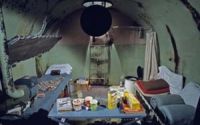 THE LONG YESTERDAY
THE LONG YESTERDAY
The period of Quiet Darkness came after the Third World War. The period was named that because there is absolutely no footage or still imagery or any kind of document or representation of any kind dating for almost a hundred years (the war obliterated almost all human settlements and the Electro-Magnetic Pulse waves erased all the information stored on any kind of electronic devices). Standing on the other side of the historic gorge, with humanity getting on its’ feet yet again, we turn towards the Quiet Darkness and attempt to recreate not just the period itself, but also the analysis of documents which refer to the
massive armed conflict that resulted in it. The idea behind the project would be an attempt to recompose from “ready-made” footage an entire narrative based on nothing but non-facts, imagination of a world that came “after”, a sort of a self-reflection through the eyes of the one that arose after the collapse of the entire world.
Director: Yelena Guillen, Španjolska

